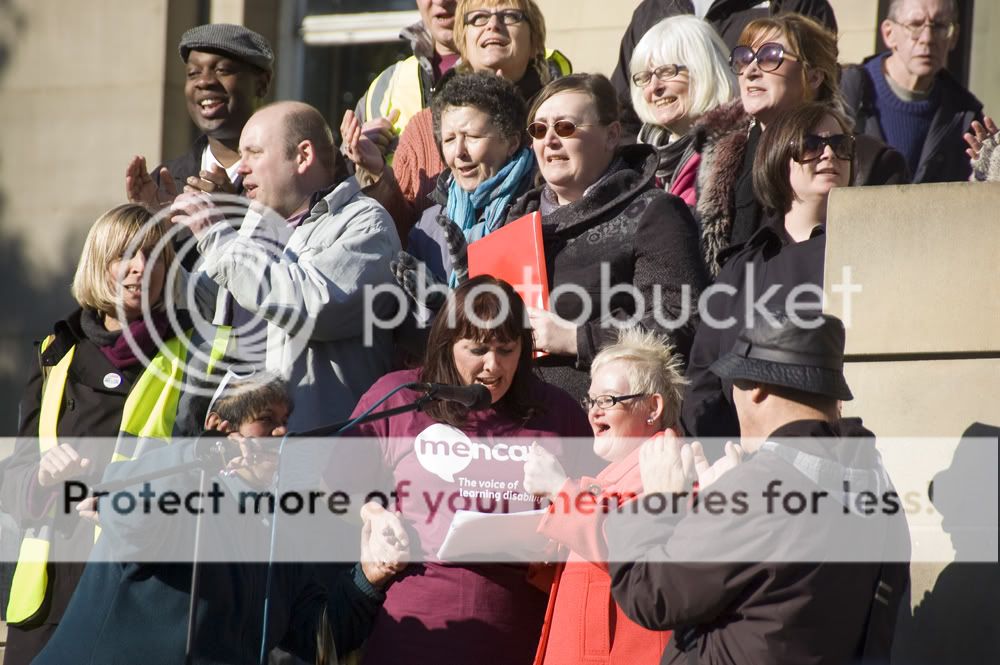A blog carnival is a regular roundup of what the best bloggers in a particular field have been talking about over the previous few weeks. It's a way of grabbing a snapshot of the online conversations that are going on, catching up with news, building up precious linkage (which every blogger craves), finding fresh and new ideas from the freshest and newest blogs and perhaps creating a community of those bloggers who write about a common topic.
Freud said that love and work are the cornerstones of our humanity, so I'm starting this blog carnival with a great blogpost about love and the things doctors say:
Love
Dave Hingsberger's writing has interested and inspired me for a long time. His work on communication with people with profound disabilities is so warm, human and clear. His talent as a storyteller makes his ideas so powerful. I was really pleased to find that Dave now has a blog, and that he is continuing to write with the same power. Today he is writing about his own experience as a person with a 'late onset disability'. This post in particular is so touching
The Doctor Thankfully Got It Wrong:
He'd taken my pulse, which he did ever single time he came to see me. It was as if he had to be reassured that I had indeed lived and that I was indeed going out into a future. As he was noting the rate of my heart, he opened my mouth and broke it. "You need to prepare yourself for what comes next. Most couples do not survive late onset disability." And then he was gone.
As his words found there way into my heart and mind, I lay there completely traumatized. It was like I'd had my breath punched out of me. My aloneness, something always present in every life, took hold of me. The doctor was gone so I couldn't protest. I couldn't shout out that we'd been together for nearly forty years. That I was sure, really sure, that it was not, would not be, over. Instead of shouting out, I shouted in. Like I wanted to shout down the specter of a Joe-less life, a Joe-less future.
I don't know if what the doctor said was true. I do know that what the doctor said was cruel. I now know that what the doctor had said, about 'us' was simply wrong. I had no cause to fear. But I did not know that then.
 |
Picture by Alistair Muir
Unicorn Theatre's 'Something in the Air' show |
Theatre
Saba Salman writing in 'The Social Issue' talks about the hard campaigning work that led to a major event at London's Unicorn Theatre around 'Autism Friendly Theatre', and the possibilities of opening theatre up to many more people:
While the mind boggles as to why this kind of large-scale theatre industry event hasn’t happened before and why it took pressure from a parent campaigner to mount, it’s better late than never. The great practice and partnership that exists needs to be widely shared, so the work of the most accessible and inclusive venues trickles down regionally and locally, reaching beyond the big towns and cities that boast the biggest venues.
If the theatre sector debate translates into visible action, people with learning disabilities and their families can see shows they love without paying through the nose for a half empty box, going out of their way to attend midweek matinees which tend to be less busy and therefore often less stressful or – worst of all – having to leave before the end, either by request or because they feel unwelcome.
Personal Budgets
Ermintrude2 is a social worker with great experience in implementing personal budgets. In her recent blogpost
Personalisation, personal budgets and Demos she uses thinking from her own experience to wholeheartedly back Demos author Claudia Wood's opposition to a 'one size fits all' approach to personal budgets, and recommends much more diverse and inclusive approaches, pointing out that there are at least 6 different ways of managing personal budgets:
If Claudia Wood were in the same room as me, I would applaud her... I want to deliver more personalised services but the only tools I have been given within my local authority are direct payments (or indirect payments) or care managed fund. All these other options have been theoretical and none have developed any flexibility.
She concludes her piece with a useful glossary of the confusing set of acronyms that have grown up around personalisation. I think this is really good practice in blogging in this field, which is acronym-heavy and light on clarity.
Engagement with Policymaking
Another example of good practice is the video blog. Video is such a direct means of communication and we need more of it. David Behan uses it to good effect in introducing the six main themes of the governments 'Caring for our future' engagement exercise
http://davidbehan.dh.gov.uk/caring-for-our-future/ These are:
1. Increasing quality and supporting the workforce
2. Increased personalisation and choice
3. Ensuring services are better integrated around people’s needs
4. Supporting greater prevention and early intervention
5. Creating a more diverse and responsive care market
6. The role of the financial services sector in supporting users, carers and their families
It's important that people with a stake in health and social care services and particularly the people who use those services make their views known to the government on all these points.
In 'This is my truth' Danny Eggar calls on the government to
listen before they make the struggle even harder:
I have claimed Disability Living Allowance (DLA) since I lost my sight in 2004, and it has been a major help to me. Recently, I was moved on to the higher rate of DLA. It helps me a lot as I use my DLA for public transport, help towards living such as rent, Council Tax and other bills. My concern, if the proposed welfare reforms are brought in, is that if I was still unemployed and taken off DLA, I would struggle to afford to live independently as I would not be able to run my flat on my own. I would also find it hard to use the train service as it would cost too much money.
I think the Hardest Hit campaign is vital, as it is demonstrating to the Government the concerns that people have about the loss of Disability Living Allowance. It would not only affect me, but thousands of other people in theUK, struggling to find employment and to live as independently as possible. If these cuts were made, it would mean a backward step for each individual currently on DLA.
I would urge everyone to support the marches and rallies happening across the UK on 22 October; as it is important we get as many people as possible to voice their concerns to the Government, and show how their everyday lives would be affected by the changes that may take place.
Individual Service Funds
Frances Brown and Simon Duffy from the Centre for Welfare Reform have brought us a practical example of how
Using an Individual Service Fund has helped a family live and overcome some major challenges for the last 14 years.
The Individual Service fund allows the family to determine when they get support how much support they get and they manage all of this on a day to day basis. They have continued to plan around Roberts needs sharing dreams and hopes for the future and using the Individual Service Fund creatively to achieve these:
This very individual arrangement gives the family the control they need and want over who supports their son, how they spend the budget and allows them to balance their son’s needs with their own needs. They have all the control, flexibility and choice they want without some of the anxieties and stresses of managing the money directly and being an employer. Robert has thrived and continues to live a full life at the centre of his loving family.
Life in a Group
One of
the problems for people living in supported living, is that they usually have little or no choice about who they live with. Too often their homes are seen as 'schemes'. Jill Faber writes in HSA Canada's blog about how she is designing a
person centred strategic planning approach for group living:
 Many of my co-workers were skeptical when I proposed person centred strategic planning for the group liiving program. It would gives us an indication of how and where people actually want to live, by which we could make plans accordingly. "Would it really be person centred?" "You are going to get people's hopes and dreams up"
Many of my co-workers were skeptical when I proposed person centred strategic planning for the group liiving program. It would gives us an indication of how and where people actually want to live, by which we could make plans accordingly. "Would it really be person centred?" "You are going to get people's hopes and dreams up"Others claimed, "Nothing can be done, this is the way it has always been". I was told that the people living in the group homes were basically prisoners of their own circumstance.
I believed the only circumstance that people were imprisoned by was that which we had created. I knew we could do better...
Oversight of the Social Care Market
The Centre for Better management in health and social care look deeper into a topic that
I covered myself a couple of days ago:
Oversight of the Social Care Market. They're concerned that the government discussion document only considers oversight important in the case of organisations like Southern Cross that are almost 'too big to fail', while maybe ignoring those 'too small to matter'. Like my own article, they call for more power to be given to the end user and for co-productive approaches to oversight:
I wonder if there are already some of the solutions before us. Models that are based on co-ownership, stake-holder capital and personal budgets may provide ways in which the huge expenditure on care by residents and the state buys more than a temporary presence in a transitory enterprise. Ways in which long-term rights and a genuine pooling of risk between citizens, providers and the state need to be created. This will provide the long term stability and quality that frail elderly deserve.
One Page Profiles
'Think About Your Life' is a blog about how people with cancer, and similar conditions, can use person centred thinking tools to think about their life and supports. Their latest post explores how one page profiles can be used to hold key information in one place, to share with the myriad of professionals and carers that people encounter:
The one page profile pulls together a lot of information that is really helpful for everyone to have that is with you on the cancer journey: family, friends, nurses, doctors, and possibly co-workers. It may also help to have copies of this to email out, post on your blog or hand to people as an update of your journey without you having to retell your story over and over.
Work
I started with love, so it fits Freud's maxim if I end with 'work'.
Helen Sanderson blogs about a new book she has co-written with Nicola Gitsham, Linda Jordan, Jaimee Lewis and Freya Elbaz, which explores not just why only 6.4% of people with learning disabilities have paid work, but also investigates the success stories, trying to discover exactly what has enabled those people who have managed to thrust themselves into work ('finding a job' sounds much too passive) and prove that people with learning disabilities can contribute as part of the workforce:
We are learning through the push for personalisation and the continued implementation of person-centred approaches in children's' and adult social services that unless employment is very high up on the agenda, young disabled people just don't get jobs. Our experience of working with young disabled people and their families across England is that they can and do want to work. We hope this book will inspire and motivate the people that support young disabled people and families that it is positive and possible to get - and keep - a job.
Can there be more carnivals like this?
The idea of a blog carnival is that a number of different blogs take turns to host the carnival, so that each different blogger can give their own take on the best of what's going on on the web, so if you are a blogger that wishes to host a future carnival, let me know, and if you know of a great example of blogging that would be interesting to other readers, let me know too!
There are hundreds of blog carnivals going on out there, but a big gap when it comes to some of the most exciting developments in personalising Health and social Care. I thought that I would grab the initiative, and begin something that might fill that gap - hence this first blogpost of the carnival of personalisation. If this is something you think should continue, then please consider taking up the baton, and bringing this carnival to your own blog. If you don't want to go to all the bother of hosting the carnival, one very helpful thing you can do is to post a link from your blog back to this one, or share it on your favourite social network.
 I illustrated that post with this picture by Jean Cocteau: "Beauty and the Beast", and promised to talk further about some of the questions it evokes in me.
I illustrated that post with this picture by Jean Cocteau: "Beauty and the Beast", and promised to talk further about some of the questions it evokes in me.









